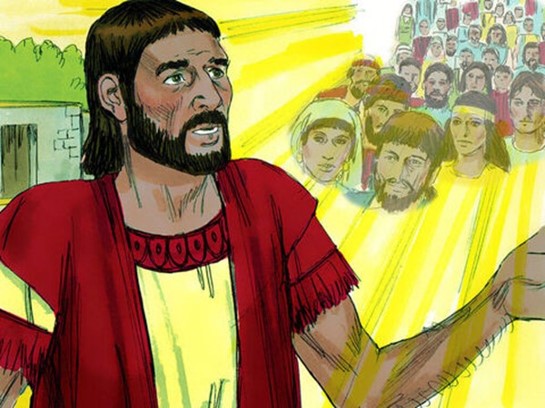Good morning!
Greetings in the name of the Father, the son, and the Holy Spirit.
By faith Abraham, when called to go to a place he would later receive as his inheritance, obeyed and went, even though he did not know where he was going. (Hebrews 11:8)

Once upon a time, in a land far away, there was a man named Abraham. He is remembered as a towering figure of faith, often referred to as the father of many nations. His story is frequently recounted to inspire and teach about the power of unwavering belief. However, the path Abraham walked was anything but straightforward. It was a winding journey marked by profound struggles, significant mistakes, and, ultimately, glorious redemption.
Abraham’s life paints a vivid picture of a man called by God to leave behind everything familiar and venture into the unknown with only a promise to hold onto. Despite the grand promises given to him by God, Abraham’s faith was tested repeatedly. There were moments of doubt, times when he took matters into his own hands, and instances where his decisions led to serious consequences. Yet, through all these challenges, God’s unwavering patience and love guided Abraham back to His promises.
Today, as we delve into Abraham’s story, we will uncover a powerful truth: faith is not something we can earn or achieve through our actions, rituals, or religious observances. Instead, it is a precious gift from God, graciously given to all who seek Him with an open heart. This exploration will reveal how God’s infinite patience, love, and grace transformed Abraham’s faltering faith into a legacy that continues to inspire millions. Let us journey together through the trials and triumphs of Abraham’s life to understand how this gift of faith is available to each one of us, regardless of our past or present circumstances.

The Imperfection of Abraham’s Faith
Abraham, originally named Abram, was called by God to leave his homeland and travel to an unknown land. This call marked the beginning of a journey that would test his faith in unimaginable ways. God’s promise to Abraham was profound: “I will make you into a great nation, and I will bless you; I will make your name great, and you will be a blessing” (Genesis 12:2). Despite this grand promise, Abraham often struggled to fully trust in God’s word, particularly because his wife Sarah was barren. As the years went by without a child, their faith began to waver.
One significant moment of doubt occurred when Sarah, feeling the weight of their childlessness, suggested that Abraham have a child with her maidservant Hagar. This led to the birth of Ishmael. This act, driven by impatience and a desire to fulfill God’s promise through their own means, revealed that even Abraham, the great patriarch, had moments of weakness. In Genesis 16:2, Sarah said to Abraham, “The Lord has kept me from having children. Go, sleep with my slave; perhaps I can build a family through her.” Abraham agreed, highlighting their struggle to wait on God’s timing.
Later, Abraham expressed further doubt by suggesting that his servant Eliezer might be his heir. In Genesis 15:2-3, Abraham said, “Sovereign Lord, what can you give me since I remain childless and the one who will inherit my estate is Eliezer of Damascus? … You have given me no children; so a servant in my household will be my heir.” Despite these missteps, God remained steadfast and patient with Abraham, reiterating His promise and encouraging him to trust.
God’s unwavering patience and love were profoundly evident when He took Abraham outside and told him to look at the stars in the night sky, saying, “Look up at the sky and count the stars—if indeed you can count them. So shall your offspring be” (Genesis 15:5). This moment was a powerful reminder of God’s promise and His ability to fulfill it despite human doubt.
To reinforce this promise and signify a new beginning, God changed Abram’s name to Abraham, meaning “father of many nations,” and Sarai’s name to Sarah, meaning “princess.” In Genesis 17:5, God said, “No longer will you be called Abram; your name will be Abraham, for I have made you a father of many nations.” Despite their frail faith, God was shaping their destiny according to His divine plan.
Abraham’s journey teaches us that faith is often a winding road with moments of doubt and uncertainty. His story shows that even those who are considered pillars of faith had their moments of struggle. Yet, God’s grace and patience remained constant, guiding Abraham back to His promises. This is a powerful reminder that our faith, though imperfect, is held secure by a God who is infinitely patient and loving.
The imperfections in Abraham’s faith highlight an essential truth: it is not the strength of our faith that saves us, but the faithfulness of God. Abraham’s story encourages us to rely not on our own understanding or efforts, but on God’s unchanging promises and His boundless grace.

Faith, Not Rituals, Brings Salvation
The story of Abraham brings to light a critical truth: neither circumcision nor baptism brings salvation. These rituals, while significant as outward symbols of faith and obedience, do not possess the power to save. Abraham was considered righteous because of his faith, and this declaration came long before the ritual of circumcision was introduced. His belief in God’s promises was credited to him as righteousness.
Romans 4:9-12 clarifies this profound principle: “Is this blessedness only for the circumcised, or also for the uncircumcised? We have been saying that Abraham’s faith was credited to him as righteousness. Under what circumstances was it credited? Was it after he was circumcised, or before? It was not after, but before! And he received circumcision as a sign, a seal of the righteousness that he had by faith while he was still uncircumcised. So then, he is the father of all who believe but have not been circumcised, in order that righteousness might be credited to them.”
Abraham’s righteousness was attributed to him because of his faith, not because of any ritual. This distinction underscores that salvation is not attained through religious observances or adherence to the law but through a genuine belief in God’s promises. Circumcision, in Abraham’s case, was merely a sign and a seal of the righteousness that came through faith.
This principle holds true for us today. Salvation is not something we earn through our actions, rituals, or adherence to religious laws. It is a gift from God, given through His grace and mercy. Ephesians 2:8-9 states clearly, “For it is by grace you have been saved, through faith—and this is not from yourselves, it is the gift of God—not by works, so that no one can boast.” Our faith, like Abraham’s, is the conduit through which we receive God’s promises and His gift of salvation.
The New Testament further emphasizes this point. In Galatians 3:6-9, Paul reiterates Abraham’s example to teach about faith and righteousness: “So also Abraham ‘believed God, and it was credited to him as righteousness.’ Understand, then, that those who have faith are children of Abraham. Scripture foresaw that God would justify the Gentiles by faith, and announced the gospel in advance to Abraham: ‘All nations will be blessed through you.’ So those who rely on faith are blessed along with Abraham, the man of faith.”
Abraham’s story illustrates that faith transcends rituals and religious rites. His belief in God was counted as righteousness before any ritual was performed, demonstrating that the heart of our relationship with God is faith. This truth liberates us from the notion that we must perform certain rituals to earn God’s favor. Instead, it invites us into a relationship based on trust and belief in His promises.
This principle is incredibly freeing and inclusive. It means that salvation is accessible to all, regardless of their background, cultural practices, or previous religious observances. What matters is faith—faith in God’s promises, faith in His provision, and faith in the ultimate fulfillment of those promises through Jesus Christ. Our rituals and practices are expressions of our faith, but they are not the means by which we are saved.
In summary, the story of Abraham underscores a foundational truth of the Christian faith: salvation is a gift of God, received through faith and not by works or rituals. This faith, like Abraham’s, connects us to God’s promises and assures us of His grace and mercy. It is through this faith that we become heirs to the promises given to Abraham and recipients of the salvation offered through Jesus Christ.

The Ultimate Gift of Faith Through Jesus Christ
The culmination of God’s promise to Abraham and to all humanity is found in Jesus Christ. God provided the ultimate proof of His love and faithfulness by sending His only Son to die for our sins and rise again for our justification. Romans 4:24-25 states, “But also for us, to whom God will credit righteousness—for us who believe in him who raised Jesus our Lord from the dead. He was delivered over to death for our sins and was raised to life for our justification.”
Jesus’ life, death, and resurrection form the cornerstone of our faith. He is the fulfillment of the promise made to Abraham, opening the way for all people to become descendants of Abraham through faith. Galatians 3:13-14 explains this beautifully: “Christ redeemed us from the curse of the law by becoming a curse for us, for it is written: ‘Cursed is everyone who is hung on a pole.’ He redeemed us in order that the blessing given to Abraham might come to the Gentiles through Christ Jesus, so that by faith we might receive the promise of the Spirit.”
Jesus’ sacrifice on the cross and His victory over death demonstrate God’s infinite patience, love, and grace. This act of divine love was not just for a select few but for all humanity. Through Jesus, God’s promise to Abraham—that all nations would be blessed through him—was fulfilled. As John 3:16 declares, “For God so loved the world that he gave his one and only Son, that whoever believes in him shall not perish but have eternal life.”
Abraham’s willingness to offer his son Isaac as a sacrifice, only to have God provide a ram in his place, is a profound foreshadowing of the ultimate sacrifice of Jesus. In Genesis 22:12-13, we read, “Do not lay a hand on the boy,” He [God] said. “Do not do anything to him. Now I know that you fear God, because you have not withheld from me your son, your only son.” Abraham looked up and there in a thicket he saw a ram caught by its horns. He went over and took the ram and sacrificed it as a burnt offering instead of his son.” Just as God provided a substitute for Isaac, He provided Jesus as the perfect substitute for us, taking on our sins and offering us His righteousness.
This act of love and grace is available to everyone, regardless of their past or present circumstances. Romans 10:9-10 assures us, “If you declare with your mouth, ‘Jesus is Lord,’ and believe in your heart that God raised him from the dead, you will be saved. For it is with your heart that you believe and are justified, and it is with your mouth that you profess your faith and are saved.” This promise is universal and all-encompassing.
Through Jesus, we see the ultimate fulfillment of God’s promise to Abraham and the embodiment of His grace. Jesus’ sacrifice transcends all barriers, making salvation accessible to everyone through faith. This is the heart of the Gospel—the good news that through Jesus Christ, we are offered the gift of salvation, not because of our works, but because of God’s boundless love and mercy.
In conclusion, the story of Abraham points us to the greater narrative of God’s redemptive plan through Jesus Christ. It reminds us that faith is a gift from God, grounded in His promises and fulfilled through His Son. As we embrace this truth, we are called to share this good news with others, inviting them to experience the transformative power of faith in Jesus Christ. This gift of faith unites us as children of Abraham, heirs to the promise, and recipients of God’s amazing grace.

Summary
The story of Abraham is a powerful reminder that faith is not a destination but a journey. Abraham’s life was marked by moments of great faith interspersed with instances of doubt and failure. Despite his flaws, God’s grace and mercy remained constant, guiding Abraham back to the promises made to him. This journey reflects a fundamental truth: our relationship with God is not defined by our perfection but by His unwavering love and patience.
Abraham’s story illustrates that salvation is not achieved through rituals or human efforts. Circumcision, while an important sign of the covenant between God and Abraham, did not confer righteousness. Instead, it was Abraham’s belief in God’s promises that was credited to him as righteousness. This principle is crucial for us today. As Paul writes in Ephesians 2:8-9, “For it is by grace you have been saved, through faith—and this is not from yourselves, it is the gift of God—not by works, so that no one can boast.” Our faith in God, rather than our adherence to rituals or good deeds, is what connects us to His salvation.
The culmination of this faith journey is found in Jesus Christ. God’s promise to Abraham reaches its fulfillment in the life, death, and resurrection of Jesus. Romans 4:24-25 tells us, “But also for us, to whom God will credit righteousness—for us who believe in him who raised Jesus our Lord from the dead. He was delivered over to death for our sins and was raised to life for our justification.” Jesus’ sacrifice and victory over death offer us the ultimate assurance of God’s love and faithfulness.
This is the good news of the Gospel: no matter who you are or what you have done, God’s gift of faith is available to you. It is an open invitation to accept His grace, not based on our merits but on His mercy. Through faith in Jesus Christ, we are justified and made righteous. This gift transcends all barriers, welcoming everyone into the family of God.
As we reflect on Abraham’s journey, let us be encouraged by the boundless grace and mercy of God. His promises are true, and His love is unending. By embracing the gift of faith, we step into a relationship with God that is transformative and eternal. This is the heart of the Gospel message—a message of hope, redemption, and unconditional love available to all who believe.
Let us pray:
Heavenly Father, we thank You for the gift of faith, given to us through Your grace and mercy. We thank You for the example of Abraham, whose journey reminds us that You are patient and loving, even when our faith falters. Help us to trust in Your promises and to accept the gift of salvation through Jesus Christ. May our lives reflect Your love and grace to those around us. In Jesus’ name, we pray. Amen.

but also for us, to whom God will credit righteousness—for us who believe in him who raised Jesus our Lord from the dead. He was delivered over to death for our sins and was raised to life for our justification. (Roman 4:24-25)
